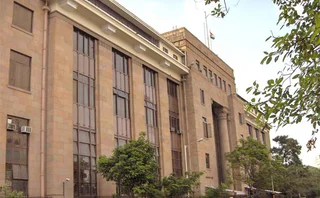
G20 calls for stronger IMF
A strengthened and expanded International Monetary Fund (IMF) is at the heart of the plan to soften the recession and repair the global financial system announced by G20 members over the weekend.
After a meeting on March 14 in Horsham, south of London, the finance ministers and central bank heads of the 19 member states and the European Union said they would back an expansion in the IMF's lending budget in order to counteract the continuing worldwide economic downturn. The IMF would also take a more active role in market supervision, concentrating on analysing the cause of the financial crisis and carrying out supervision and stress to identify future problems.
The Financial Stability Forum, a group of central bank chiefs and financial regulators, will work with the IMF on regular early warning tests, designed to simulate the outbreak of international financial crises.
Multilateral institutions like the IMF and the Asian Development Bank were the best tools to protect developing nations from the crisis, by providing countercyclical lending to substitute for the loss of private-sector capital, attendees said in a communiqué issued after the meeting. The communiquéalso backed better international cooperation between regulators, credit rating agency registration, stronger macro-economic oversight and counter-cyclical regulation.
The meeting comes in advance of the G20 heads of government summit, to be held in London on April 2.
See also: New members will boost surveillance, FSF says
Where rocky horror assets go
IMF and Fed plan bailouts for emerging markets
Only users who have a paid subscription or are part of a corporate subscription are able to print or copy content.
To access these options, along with all other subscription benefits, please contact info@risk.net or view our subscription options here: http://subscriptions.risk.net/subscribe
You are currently unable to print this content. Please contact info@risk.net to find out more.
You are currently unable to copy this content. Please contact info@risk.net to find out more.
Copyright Infopro Digital Limited. All rights reserved.
As outlined in our terms and conditions, https://www.infopro-digital.com/terms-and-conditions/subscriptions/ (point 2.4), printing is limited to a single copy.
If you would like to purchase additional rights please email info@risk.net
Copyright Infopro Digital Limited. All rights reserved.
You may share this content using our article tools. As outlined in our terms and conditions, https://www.infopro-digital.com/terms-and-conditions/subscriptions/ (clause 2.4), an Authorised User may only make one copy of the materials for their own personal use. You must also comply with the restrictions in clause 2.5.
If you would like to purchase additional rights please email info@risk.net
More on Financial stability
A regulatory storm hits China
Regulators are imposing a new wave of tighter financial supervision
Haldane dismisses talk of monetary and macro-prudential tensions
Bank of England’s Andrew Haldane says it is a virtue that different tools can be used to meet conflicting objectives
Central banks laying the seeds for crisis, says UK MP Baker
Chair of UK parliamentary group for economics says a sharp correction in developed world sovereign bond prices could spark a collapse in confidence
Q&A: Mark Branson on the too-big-to-fail problem, modelling and Basel III
Switzerland went first – and furthest – on post-crisis banking reforms, making its industry a test case for the impact of the new regime. But it has not yet solved the too-big-to-fail problem, Mark Branson, chief bank supervisor at Eidgenössische…
Risk Annual Summit: Depositors will trust EU guarantee despite Cyprus, says BdF official
Policy-makers have incentive to accelerate deposit guarantee plans, says Sylvie Matherat of the Banque de France
Risk Annual Summit: Banking union set for mid-2014, says ECB
National supervisors made “gigantic mistakes”, says ECB's financial stability head
RBI sees developing repo markets necessary in meeting Basel liquidity rules
India central bank views repo as an increasingly important market in the wake of Basel III implementation
ESRB narrows its macro-prudential tools
The European Systemic Risk Board is about to announce a slimmed-down list of potential macro-prudential tools, but who has the power to use them is still the subject of debate. By Michael Watt







